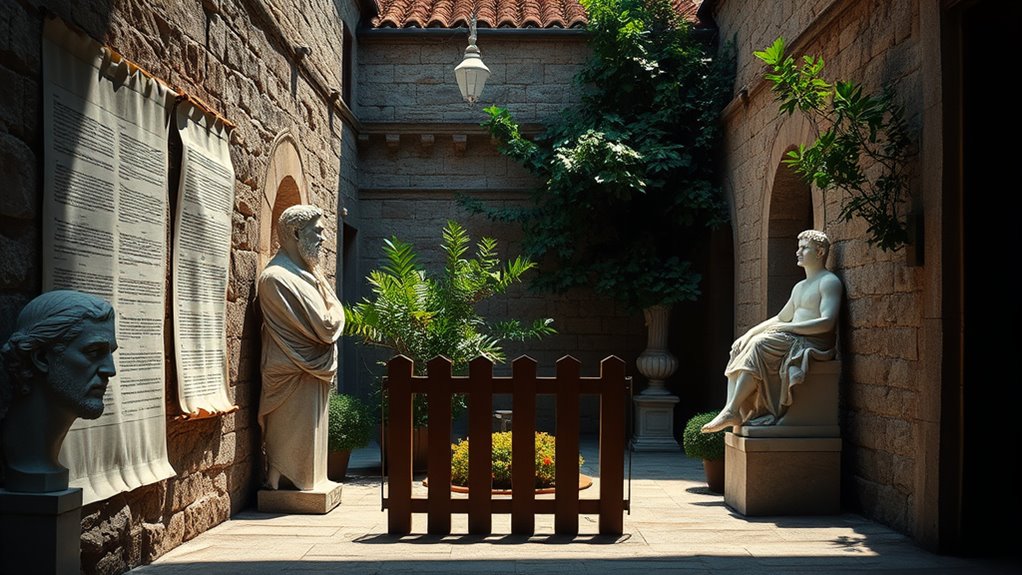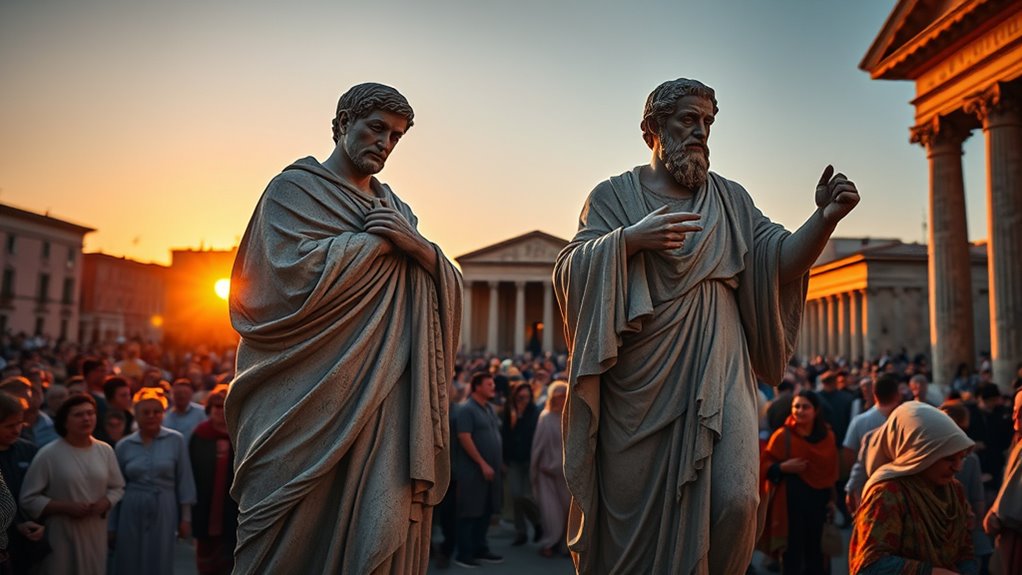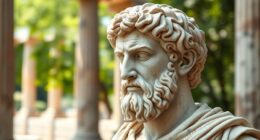The clash of ancient philosophies like Stoicism and Epicureanism reveals contrasting views on happiness, virtue, and the cosmos. Stoics believe that virtue and rationality guide a purposeful universe, urging active engagement with society, while Epicureans prioritize personal tranquility and moderation, often withdrawing from politics. Their debates over divine influence and the soul shaped Roman life and still influence modern wellbeing. Keep exploring to uncover how these ideas continue to influence our morals and choices today.
Key Takeaways
- The primary clash was between Stoics, advocating virtue and divine rationality, and Epicureans, emphasizing pleasure and atomic randomness.
- Stoics promoted active political engagement, while Epicureans favored withdrawal for personal tranquility.
- Divergent views on divine intervention: Stoics saw gods as purposeful, Epicureans viewed them as indifferent.
- Both philosophies rejected immaterial souls, emphasizing physical explanations for human nature and ethics.
- Their rivalry influenced Roman society, shaping practical ethics, leadership, and modern well-being practices.
Origins and Foundations of Stoicism and Epicureanism

Both Stoicism and Epicureanism emerged in Athens during the early 3rd century BC, founded by thinkers who sought practical ways to live well amid life’s uncertainties. Their origins reflect influences from ancient dietary practices, emphasizing moderation and self-control to promote well-being. Architectural influences also shaped their teachings, with Stoics inspired by the orderly, rational design of Greek temples, symbolizing harmony and divine rationality. Epicureans, meanwhile, favored simpler, communal spaces that encouraged retreat and reflection. These foundations reveal their shared focus on living virtuously and peacefully, despite differing views on pleasure, virtue, and the role of divine influence. Additionally, their development was influenced by broader cultural trends that valued self-control and rational understanding as essential components of a good life. Their philosophies also integrated ideas about the importance of ethical behavior and personal discipline, which were central to their teachings on achieving a fulfilled and tranquil existence. Furthermore, the emphasis on rational inquiry played a crucial role in shaping their approaches to understanding the nature of happiness and the cosmos, with some scholars noting that their development was also shaped by the prevailing intellectual climate of their time. Recognizing the significance of mental discipline, both schools emphasized the cultivation of inner resilience and clarity in the pursuit of virtue and contentment.
Differing Visions of Happiness and Virtue

Understanding how Stoics and Epicureans envision happiness and virtue reveals their fundamental differences in approaching the art of living. Stoics see happiness as rooted in virtue, emphasizing ethical resilience amid life’s challenges. They believe emotional resilience develops through self-control and aligning with nature’s rational order, especially when facing ethical dilemmas. Additionally, the concept of natural harmony plays a crucial role in how each philosophy guides individuals toward their respective ideals of well-being. The emphasis on rational order underscores the importance of aligning one’s actions with nature’s logical structure to attain true happiness. For example, the Stoic focus on self-control exemplifies their belief in mastering desires to achieve inner tranquility. Epicureans, on the other hand, focus on pleasure within moderation, seeking tranquility through private joys and avoiding pain. Happiness for them involves minimizing desire and external disturbances. Virtue remains important but is a means to inner peace, not the sole goal. These contrasting visions shape their unique paths to a fulfilled life, with the Epicurean approach often emphasizing pleasure moderation as essential to happiness.
Political Engagement: Active Participation Versus Withdrawal

While the philosophies share a concern for living a virtuous and tranquil life, they differ sharply in their views on political engagement. Stoics see active participation and ethical activism as essential to cultivating virtue and fulfilling social duties. They believe engaging in politics helps achieve justice and moral growth. Epicureans, however, favor withdrawal from politics, prioritizing personal tranquility and avoiding the chaos of public life. They see political apathy as a way to maintain inner peace and avoid unnecessary pain. For you, choosing between active involvement or withdrawal involves balancing the pursuit of virtue with the desire for serenity, shaped by each philosophy’s stance on civic responsibility.
Cosmology and the Nature of Divinity

Cosmology forms a core aspect of how these philosophies view the universe and the divine. For Stoics, divine rationality permeates everything, creating a purposeful and ordered cosmos. They see the universe as a manifestation of this rationality, with divine intelligence guiding all. This view promotes the idea of a rational cosmos, where natural laws reflect divine reasoning. Additionally, the concept of divine providence underscores the Stoic belief in a universe governed by divine wisdom and purpose. Epicureans, however, deny divine involvement, emphasizing atoms and void, where the atomic swerve introduces randomness and free will. Gods exist as detached, mental constructs, not active creators. This fundamental difference shapes their understanding of divinity—Stoics as divine agents shaping fate, Epicureans as indifferent beings. Your view on divine rationality reflects these contrasting cosmological frameworks, shaping your beliefs about the universe’s origin and purpose. Additionally, the resale value of certain philosophical ideas can influence how they are adopted or rejected over time. Furthermore, the cosmological assumptions underlying each philosophy inform their perspectives on the divine’s role in the cosmos.
Disputes Over the Role of Religion and the Gods

Disputes over the role of religion and the gods reveal fundamental differences between Stoicism and Epicureanism. You imagine:
- Epicureans viewing gods as indifferent, detached, and unconcerned with human affairs, embodying divine indifference.
- Their atheistic tendencies, suggesting gods exist but lack involvement, making them mental constructs rather than active beings.
- Stoics believing gods actively guide the universe, infusing divine rationality into all, emphasizing divine providence.
- Their rejection of gods as human projections, asserting instead a divine presence that permeates everything.
- The debate over divine intervention underscores the contrasting views on whether the gods influence human destiny or remain distant.
Influence in Roman Society and Social Life

The influence of Stoicism and Epicureanism in Roman society extended beyond philosophical circles into politics, education, and daily life. You see Roman social networking shaping how ideas spread, with influential figures like Cicero and Lucretius promoting these philosophies. Philosophical mentorship was common among elites, who sought guidance on virtue, moderation, and pleasure. Epicureans like Atticus fostered private circles, while Stoics trained young nobles in public duty. These schools affected political decisions and personal conduct, blending philosophical principles with social norms. Additionally, the cultivation of cultural intelligence helped Roman leaders navigate the diverse social and cultural landscape, shaping their ability to lead effectively across different groups. The integration of body awareness techniques, inspired by philosophies that emphasized harmony between mind and body, also influenced Roman approaches to health and well-being. Furthermore, the dissemination of self-awareness practices contributed to the development of personal discipline and resilience in Roman citizens. The adoption of practical philosophy strategies allowed individuals to better manage everyday challenges, fostering a sense of emotional resilience that was highly valued in Roman society. Ultimately, both philosophies helped define Roman values, shaping behavior, leadership, and social interactions across different strata.
Approaches to Leisure and Personal Reflection

In Roman society, both Stoics and Epicureans saw leisure and personal reflection as essential for living a meaningful life, but they approached these pursuits differently. You might practice:
- Engaging in meditative techniques to cultivate self-awareness practices.
- Reflecting on your virtues or pleasures during quiet moments.
- Using journaling or mental exercises to strengthen your mind.
- Seeking solitude to deepen your understanding of yourself and your goals.
- Incorporating mindful exfoliation into your skincare routine to promote both physical and mental well-being, aligning with their emphasis on intentional self-care. Additionally, exploring crochet styles for locs can serve as a creative form of meditation, fostering mindfulness through tactile engagement.
Both Stoics and Epicureans emphasize active reflection, turning leisure into a means for virtue. Epicureans focus on internal calm, using leisure for pleasure without excess. Both aim to nurture the soul through mindful, intentional quiet. Incorporating paint sprayer maintenance into your routine can also serve as a form of focused, meditative activity, helping to cultivate patience and attention to detail.
Materialist Physics and the Concept of the Soul

Materialist physics in both Epicureanism and Stoicism rejects the idea of immaterial domains or spiritual substances, asserting instead that only material bodies exist. They deny dualism, arguing that the soul is not a separate spiritual substance but a physical process. Epicureans see the soul as composed of atoms, dissolving at death, with no afterlife. Stoics believe the soul is a physical part of the body, infused with divine rationality. This view fuels the ongoing dualism debate, emphasizing that consciousness and identity arise from material interactions, not from a separate spiritual realm. Additionally, these perspectives highlight the importance of empirical evidence in understanding the nature of reality and the soul.
Philosophical Rivalry and Cross-Influences in Practice

Despite their fundamental differences, Stoicism and Epicureanism often influenced each other through practical engagement and shared social contexts. You might picture:
Despite differences, Stoics and Epicureans exchanged ideas through social interactions and practical engagement.
- A Stoic practicing Stoic apathy, yet attending Epicurean dinners to understand pleasure’s role.
- An Epicurean seeking moderation in hedonism while debating virtue with a Stoic.
- Philosophers exchanging ideas at social gatherings, blending self-control with joyful living.
- Politicians influenced by Epicurean moderation, adopting Stoic calm in public duties.
Their rivalry fostered mutual insights—Stoics learned to embrace moderate pleasure, while Epicureans recognized the value of virtue—shaping their methods in real life.
Modern Relevance of Ancient Philosophical Clash

The dynamic interplay between Stoicism and Epicureanism continues to shape modern approaches to well-being and ethical living. You can see this influence in modern therapy, where mindfulness and emotional regulation draw from Stoic self-control, and self-care practices echo Epicurean moderation. When facing ethical dilemmas, Stoic virtues guide you to act with justice, while Epicurean pleasure principles remind you to seek internal peace.
| Approach | Focus |
|---|---|
| Stoicism | Virtue, resilience, external actions |
| Epicureanism | Moderation, personal happiness, internal calm |
| Modern Therapy | Emotional regulation, mindfulness, ethical clarity |
Frequently Asked Questions
How Did Stoics and Epicureans Influence Early Christian Thought?
You see, Stoics and Epicureans influenced early Christian thought by shaping ideas like virtue cultivation and material detachment. Stoics emphasized living virtuously and accepting divine providence, which resonated with Christian virtues. Epicureans promoted moderation and detachment from material excess, aligning with spiritual pursuits. Both schools helped early Christians develop moral discipline and a focus on inner peace, blending philosophical insights into faith practices that valued virtue and spiritual independence.
Were There Prominent Figures Who Combined Aspects of Both Philosophies?
You might find that some figures practiced philosophical syncretism, blending aspects of both Stoicism and Epicureanism. They embraced dual world perspectives, recognizing the importance of virtue and moderation while also valuing personal tranquility. For instance, Seneca integrated ideas from both, emphasizing active virtue and reflection. Such individuals sought harmony between the philosophies, demonstrating that combining these approaches could lead to a more balanced, practical way of living in turbulent times.
How Did These Philosophies Impact Roman Legal and Ethical Practices?
Imagine Roman law as a sturdy bridge built on philosophical pillars. Stoicism’s emphasis on virtue and duty shaped ethical codes, fostering justice and self-control. Epicurean ideas, advocating moderation and personal happiness, softened moral expectations, encouraging individual well-being. Together, they created a legal landscape balancing civic responsibility with personal contentment, guiding Romans to live harmoniously within society while honoring their inner peace. Your role is to see how these ideas still echo in modern ethics.
Did Stoics or Epicureans Have Differing Views on Wealth and Materialism?
You’ll find that Stoics and Epicureans held contrasting attitudes toward wealth and materialism. The Stoics critiqued excessive pursuit of wealth, emphasizing virtue and inner riches over material gains. In contrast, Epicureans saw modest material comfort as a source of pleasure, but warned against greed and excess. They valued simple living and believed true happiness came from moderation, not materialism. So, their perspectives reveal a clear difference in their wealth critique and attitudes toward material possessions.
What Modern Philosophies Draw Heavily From Either Stoic or Epicurean Ideas?
Imagine a map guiding your journey through life’s terrain. Modern philosophies like virtue ethics draw from Stoic ideas, emphasizing character and inner strength, while hedonistic pursuits mirror Epicurean pleasure-seeking. You see these influences in ethical frameworks that prioritize moral virtue over fleeting pleasures or in lifestyle choices that balance self-control with the pursuit of happiness. These ancient roots shape contemporary paths, offering wisdom to navigate the complex landscape of modern living.
Conclusion
In the end, you might find it amusing how these ancient rivals still shape your choices—whether you chase virtue or pleasure, engage with society or withdraw. Ironically, their debate about happiness, divine involvement, and the good life continues to echo in your daily decisions. So, next time you ponder life’s purpose, remember: centuries of philosophy have already argued it out—yet, somehow, you’re still trying to figure it all out.









